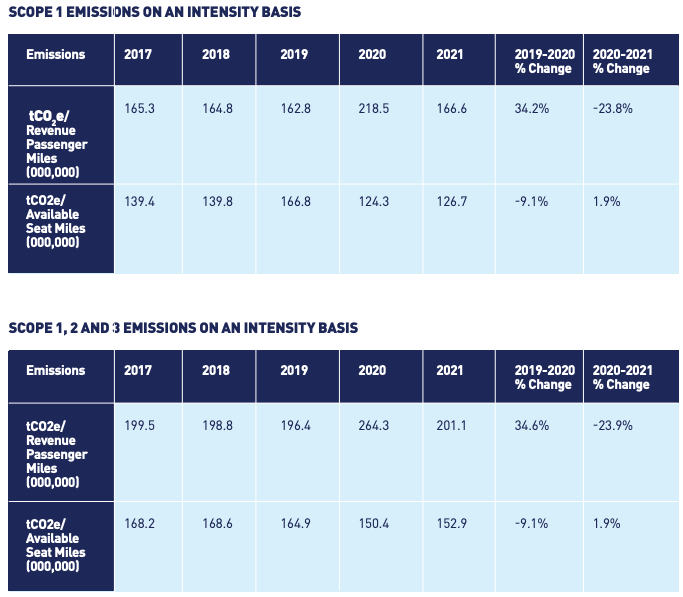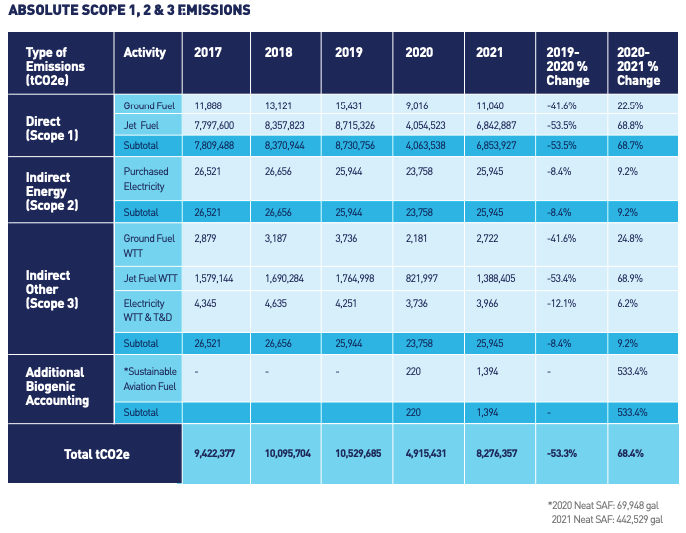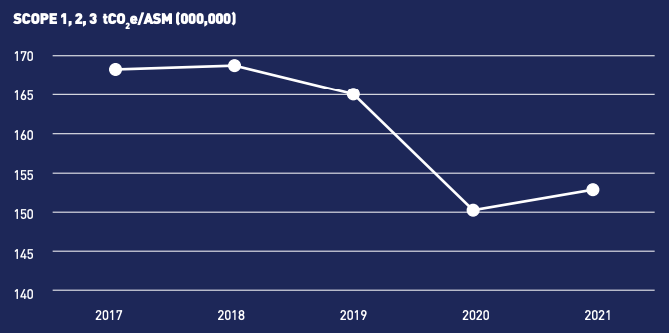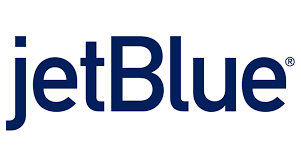Sustainability Goals
Sustainability Goals through 2030
2025 Goals
- Double race and ethnic minority representation at the officer and director level from 12.5% to 25%
- Increase representation of women at the officer and director level, from 32% to 40%
- Engage with 80% of top active business partners (by spend) on ESG principles within JetBlue’s Business Partner Code of Conduct by 2023
- Integrate ESG and DEI into the Board member selection process by 2021
- Establish ESG goals tied to senior leadership compensation by 2021
- Cease purchasing carbon offsets for its domestic flights, and instead increase its investment in and use of SAF by the end of 2023
- Convert 40% of 3 main ground service equipment vehicle types to electric
2030 Goals
- Convert 40% baggage tractors, belt loaders, and pushback tractors to electric across owned fleet by 2025; 50%
- Decrease aircraft emissions 25% per available seat mile by 2030 from 2015 levels, excluding offsets
- Convert 10% of total jet fuel to be from blended sustainable aviation fuel
- Convert 50% of 3 main ground service equipment vehicle types to electric
2035 Goals
- Reduce Scope 1 and 3 emissions related to jet fuel by 50% per revenue tonne kilometer (RTK) (2019 baseline)
2040 Goals
- Achieve net-zero carbon emissions (including carbon offsets)
Additional Goals (No Timeline)
- Begin offsetting CO2 emissions from jet fuel for 100% of its domestic flights beginning in July 2020
- Begin flying with sustainable aviation fuel on flights from San Francisco International Airport
- Eliminate single-use plastics within service ware where possible; using only recyclable plastic
- Maintain at least an 80% recycling rate for audited domestic flights
Latest Sustainability Reporting



Recent News
2023
Announced a partnership with climate tech company CHOOSE enabling JetBlue customers to contribute to a fund dedicated to covering the cost premium of sustainable aviation fuel (SAF). This allows customers to estimate their flights’ emissions and upgrade from conventional fuel to SAF to reduce their scope 3 emissions. (March 2023)
2022
Committed to reducing Scope 1 and 3 emissions related to jet fuel by 50% per revenue tonne kilometer (RTK) by 2035 from a 2019 baseline. This target, approved by the Science Based Targets initiative (SBTi), aligns with the company’s goal to reach net zero emissions by 2040. To meet this target, JetBlue will increase its use of Sustainable Aviation Fuel (SAF); improve aircraft technology, fuel efficiency, and operations; and invest in high-quality carbon offsets. In 2023, the company will also stop purchasing carbon offsets for its domestic flights, instead increasing its investment in and use of SAF. (Dec 2022)
RUBICON CARBON — Launched as a new carbon credit platform to scale and provide easier access to high-integrity emissions reduction solutions by vetting projects and their credits. Rubicon received an initial capital commitment of $300 million from CEF member TPG, with a total capital commitment target of $1 billion. As part of its launch, Rubicon also formed a coalition of corporate sustainability leaders to help guide its platform and product development, including CEF members Bank of America, Dow, GE, Honeywell, J.P. Morgan, JetBlue, McKinsey & Co., and TD Bank. (Dec 2022)
JETBLUE / FIDELIS NEW ENERGY — Announced an MOU to provide JetBlue at least 92 million gallons of blended sustainable aviation fuel (SAF) over a five-year term starting in 2025. The SAF is from Fidelis’s Grön Fuels GigaSystem, which is designed to achieve negative lifecycle carbon intensity by integrating renewable feedstocks, biomass energy, and CCS. (Dec 2022)
Sustainable fuels startup Air Company announced the launch of its Sustainable Aviation Fuel (SAF) made from captured CO2, named AIRMADE SAF. Global aviation partners, including JetBlue and Virgin Atlantic have made commitments to purchase over one billion gallons of the fuel. The U.S. Air Force has already completed an unmanned flight using the fuel. (Sept 2022)
2021
Sustainable Aviation Buyers Alliance
(SABA) Aviators Group — A new SABA group formed by four companies—including CEF members
Amazon
and JetBlue Airways—to drive investment in “high-integrity” sustainable aviation fuel. SABA also unveiled its formal membership structure,
opened membership to private and public organizations worldwide, and announced that CEF member
Meta (formerly the Facebook company) has joined its Customers Group. (Nov 2021)
MORE »
Doubled its previous sustainable aviation fuel (SAF) agreement with SG Preston to be worth an estimated $1 billion
over 10 years. SG Preston will deliver at least
670 million gallons of blended SAF for JetBlue’s flights from 3 New York airports,
which will help JetBlue avoid approximately 1.65 million tons of CO2 emissions. Delivery is expected in 2023. (Oct 2021)
MORE »
The Biden administration announced a series of actions to fulfill its new goal of reducing emissions in the aviation sector by 20% by 2030, including (Sept 2021):
- A government-led challenge to supply at least 3 billion gallons of SAF to US aircraft operators annually by 2030 and sufficient SAF to meet 100% of demand by 2050. Alongside this announcement, Airlines for America—whose members include CEF members Delta, JetBlue, and UPS—pledged to work to meet the goal.
- Up to $4.3 billion of new and ongoing funding for sustainable aviation fuel (SAF) projects
- An SAF tax credit
Democrat lawmakers introduced the “Sustainable Skies Act” to create a tax credit for sustainable aviation fuel (SAF) production—up to $2 per gallon—through 2031. A coalition of over 50 groups and businesses—including Boeing, FedEx, JetBlue, and UPS—sent a letter to lawmakers supporting the bill, which applies to SAFs offering at least a 50% reduction in GHG emissions compared to conventional fuels. (May 2021)
Hundreds of executives, nonprofits, and companies—including Amazon, Apple, Bank of America, BlackRock, Cisco, Dell Technologies, Facebook, Ford, General Motors, Google, JetBlue, Johnson & Johnson, Mastercard, and McKinsey & Co.—signed a public statement opposing “any discriminatory legislation.” The statement, titled “We Stand for Democracy,” was featured in advertisements in the New York Times and The Washington Post. (April 2021)
JETBLUE — Announced a set of short and medium-term ESG targets, as well as a partnership with EARTHDAY.ORG to encourage volunteer opportunities throughout the airline’s network for its annual GreenUp Initiative during Earth Month. Targets include (April 2021):
- Achieving net-zero carbon emissions by 2040 (including carbon offsets)
- Decreasing aircraft emissions 25% per available seat mile by 2030 from 2015 levels, excluding offsets
- Converting 10% of total jet fuel to be from blended sustainable aviation fuel by 2030
- Converting 40% of 3 main ground service equipment vehicle types to electric by 2025 and 50% by 2030
- Eliminating single-use plastics within service ware where possible; using only recyclable plastic
- Maintaining at least an 80% recycling rate for audited domestic flights
- Doubling race and ethnic minority representation at the officer and director level to 25% by the end of 2025
- Increasing representation of women at the officer and director level, from 32% to 40% by the end of 2025
- Engaging with 80% of top active business partners (by spend) on ESG principles within JetBlue’s Business Partner Code of Conduct by 2023
- Integrating ESG and DEI into the Board member selection process by 2021
- Establishing ESG goals tied to senior leadership compensation by 2021
AIRLINES FOR AMERICA (A4A) — The industry trade organization representing major U.S. airlines—including FedEx, JetBlue, and UPS—announced its members' commitment to achieve net-zero carbon emissions by 2050.
Members plan to partner with government and business stakeholders to accelerate the development of commercially viable sustainable aviation fuel (SAF), with a goal of making 2 billion gallons of SAF accessible to U.S. aircraft operators by 2030. (March 2021)
MORE »
Over 170 CEOs from U.S. companies issued a public letter to Congress backing President Biden’s $1.9 trillion coronavirus relief package and urged rapid, bipartisan adoption. CEF member companies involved included BlackRock, Comcast, Google, JetBlue, Mastercard, Morgan Stanley, Siemens, and Visa. (March 2021)
JetBlue announced new diversity and inclusion (D&I) goals for its officer and director level, including doubling its race and ethnic minority representation from 12.5% to 25% and increasing women's representation from 32% to 40% by 2025. It also plans to launch two new internal career development programs to support its D&I strategies and create greater access to select career paths for employees. (March 2021)
2020
JetBlue has amended an existing $550 million senior secured revolving credit facility with BNP Paribas to include a sustainability-linked provision, becoming the first airline to accomplish this type of transaction. The sustainability-linked loan enables the company to align its strategic initiatives with its environmental, social, and governance performance goals and objectives. (March 2020)
JetBlue will begin offsetting CO2 emissions from jet fuel for 100% of its domestic flights beginning in July 2020, making it the first major U.S. airline to do so. The company also announced plans to begin flying with sustainable aviation fuel on flights from San Francisco International Airport by mid-2020. (Jan 2020)
2019
JetBlue is transitioning to a fully-electric fleet of baggage tractors and belt loaders at New York’s JFK International Airport. The new fleet — which will be the largest of its kind at JFK International Airport — could reduce GHG emissions by 4 million pounds annually and reduce ground fuel costs by more than $500,000. (Sep 2019)
Co-published “Estimating Reef-Adjacent Tourism Value in the Caribbean” (The Nature Conservancy, JetBlue, the World Travel & Tourism Council and Microsoft) quantifying the value that coral reefs contribute to the Caribbean economy through tourism. The report finds that the value of all reef-associated tourism is estimated at over $7.9 billion annually, representing 23% of all tourism expenditure. (Jan 2019)

